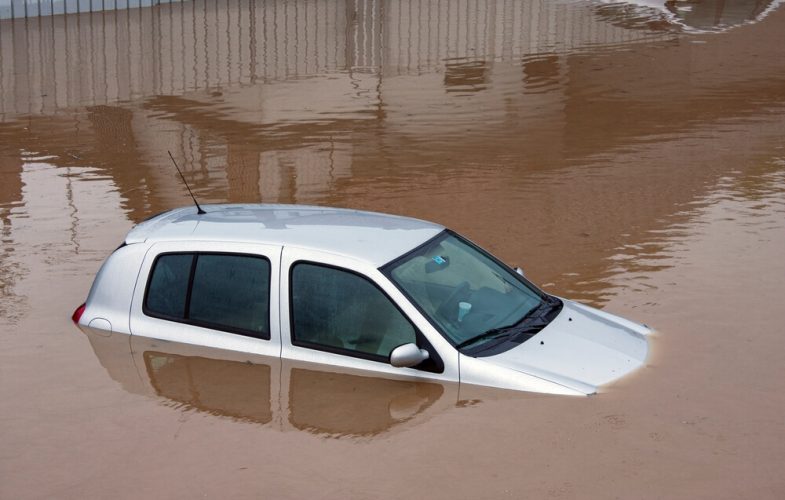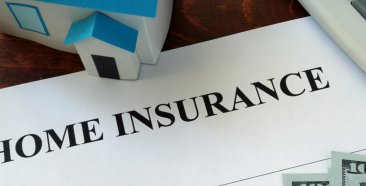
If you think your vehicle is immune to the risks of flooding — think again. It may not be every day that floodwater creeps up on your vehicle, but it certainly can happen. Here are some myths about flooding and your vehicle debunked, and why it’s important to have auto insurance that will cover flood damage.
Myth #1: Flooding doesn’t happen everywhere
You may not think you or your car is vulnerable to flooding, but flooding occurs in every U.S. state and territory — literally anywhere in the world that receives rain. With that said, there are, of course, some areas more prone to flooding than others.
Due to construction of buildings, highways, driveways, and parking lots, densely populated areas are at a high risk for flash floods. The reduced amount of rain absorbed by the ground creates increased runoff, making conditions right for flash flooding. Storm drains can also become overwhelmed or plugged by debris during heavy rain, flooding the roads and buildings nearby.
Areas near rivers are also at a higher risk from floods. Dam and levee failures have been to blame for some of the most devastating flooding in the country, including Hurricane Katrina in 2005, which left nearly 80 percent of New Orleans under water after the levees broke.
Areas surrounded by mountains and steep hills are also at risk as they produce rapid runoff, which causes streams to rise quickly. In the West, some canyons, small streams, and dry arroyos can be flooded after very intense rainfall.
When it comes to the risk your vehicle is at for flooding, remember that your car isn’t always in the same place at the same time. Where you park your car at work, for example, may be at a higher flood risk than your home. During travel, you may not realize the geography you’re driving through is just one heavy storm away from a flash flooding situation. Since rain can come and go at any time, the risk is always there.
Myth #2: Flooding doesn’t cause that much damage
Flooding causes close to $8 billion in damage a year, just in the United States. Flash flooding (when an area gets heavy rainfall in a short period of time, causing water to rise rapidly) occurs with little warning and is the most hazardous weather disaster in the United States.
As you can imagine, that much water is not good for a car. It can ruin your vehicle’s electronics, lubricants, and mechanical systems. Over time, corrosion can find its way to your car’s vital electronics, like your airbag controllers. Even minor flooding can lead to rust, mold in the car, and other problems and other problems. You should also never start a flooded vehicle until a thorough inspection and cleaning is performed. Starting your car with water in the engine could cause more damage.
Generally, when water rises above the floorboards and into the areas where electronics begin, insurance companies will likely determine the vehicle a total loss. You’ll want to contact your insurance company or agent to report the exposure of your vehicle to water or flood right away.
Myth #3: I can just drive my car out of the flood water
If news footage over the years of cars floating downstream in floodwaters after hurricanes and other disasters hasn’t swayed you, take a look at these facts from FEMA:
- Just six inches of water will reach the bottom of most passenger cars causing loss of control and possible stalling.
- A foot of water will float many vehicles.
- Two feet of rushing water can carry away most vehicles including sport utility vehicles and pick-up trucks.
Once your vehicle is floating, your car will go the direction the water takes it, giving you zero control. If that water is moving, your vehicle could be swept away, tipped on its side or flipped. Almost half of all flash flood fatalities occur in vehicles. NEVER try to drive your vehicle through flood waters.
Rising water can enter your vehicle in a manner of minutes, even seconds. If floodwaters do rise around your car, you should abandon your car and move to higher ground if you can do so safely. If you see water on the road, turn around, because it can be much deeper than it looks. Even after flood water has receded, roads may have weakened and could collapse under the weight of a car.
From an insurer’s point-of-view, even if you drive through flood waters safely, you will likely have caused even more damage to your car.
Myth #4: My homeowners/renters insurance covers my car if its flooded
It sure doesn’t. Homeowners insurance or renters insurance may cover items stolen from your car, for example, but it does not cover the vehicle itself. Plus, as we’ve established, your car is not always at home when a flood happens. For your car to be covered, you need a comprehensive auto insurance policy.
Myth #5: My state minimum auto insurance policy will cover flood damage
Most states only require bodily injury liability insurance, with some states also requiring uninsured/underinsured motorist coverage. These policies protect the people inside the vehicles, not the vehicles themselves.
Uninsured/underinsured property damage coverage is also required by some states, but it only covers damage caused to your vehicle by an uninsured or underinsured driver, not natural disasters.
Fact: You need comprehensive auto insurance to be covered for flooding
Comprehensive insurance is an optional coverage designed to protect your vehicle. Unlike your liability coverage (often the state-required policy), which covers damage you cause to other drivers and vehicles, comprehensive coverage protects your vehicle from things like theft, vandalism, damage caused by animals, hail, lightning, and water and flood damage.
It’s important that you have this coverage before your car is caught in a flood. Now that you know why comprehensive auto insurance is so important in protecting your vehicle from flooding, why not get a free car insurance quote from Freeway Insurance? Freeway can provide you the best comprehensive and collision coverage in the state. Get a free car insurance quote online or contact us at (800) 700-5620 for more information.



